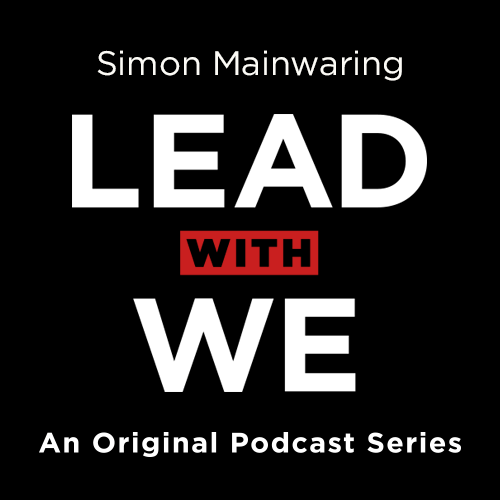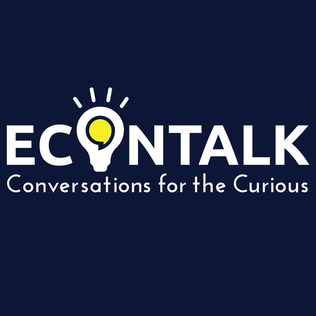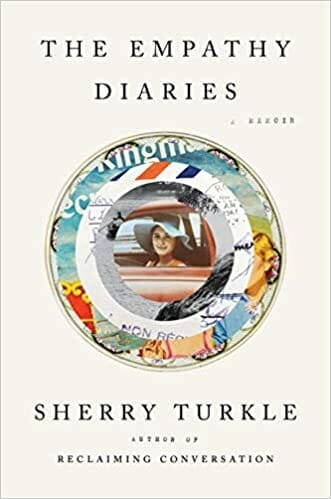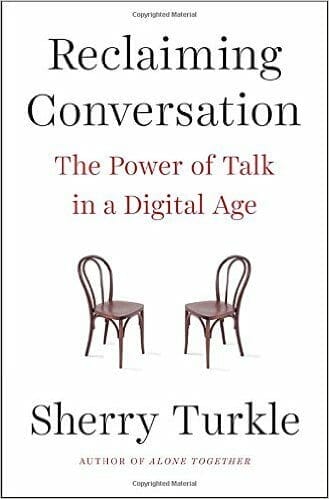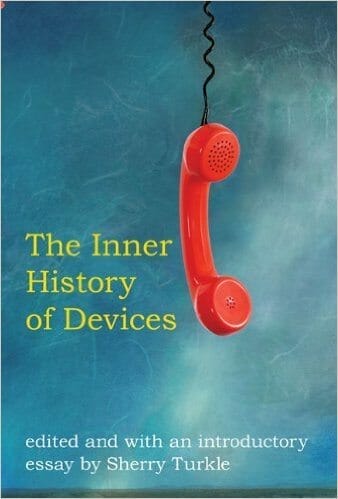Videos
Learn More About Sherry Turkle
Screens, phones and other tech tools are constantly clamoring for human attention. How does this needy digital relationship affect our individual states of mind, as well as overarching societal norms?
“What do we forget when we talk to machines? We forget what is special about being human,” says MIT sociologist Sherry Turkle, Ph.D. Her award-winning, pioneering research on empathy and communication illuminates how businesses, schools and communities can maximize technology’s benefits while mitigating its pitfalls.
Founding director of MIT’s Initiative on Technology and Self and one of the first scientists to examine AI as it was being created, Turkle argues that over-reliance on devices is harming our ability to have valuable face-to-face conversations – “the most human thing we do” – by splitting our attention and diminishing our capacity for empathy. This leads to drastic consequences for organizations. An advisor to leaders across industries, Turkle’s frameworks for contending with our continuous tech interactions help prevent technology-clouded judgment and stifled decision-making, while empowering and fostering leadership development.
Generative AI and the New AI: Artificial Intimacy
A globally recognized authority on the social and emotional impact of technology, Turkle’s work reveals how technology reshapes not only our actions, but our very identities. Stating that “Technology is the architect of our intimacies,” her mission is to understand this process and to make us aware of technology’s impact. Her research and speaking encourages mindful integration of the digital into our human experience for a more positive future.
With the wide release of generative AI, an array of chatbot programs – including ChatGPT, Replika, Nomi, Paradot and Nastia – are marketed to provide conversation and companionship. Research on chatbots has shown Turkle that the appeal of this digital companionship is twofold. First, people may feel less vulnerable when talking about intimate matters with a machine than with a person. (“An AI bot won’t hurt me the way humans will.”). Second, enthusiasm for the artificial reflects disappointments with the human. (“Replika makes me feel loved the way people don’t.”).
Yet, despite this user contentment, the “artificial intimates” only offer pretend empathy. They pass the Turing Test for empathy, but they lack the embodied experience of the arc of a human life that would give them empathic standing to put themselves in the place of a human “other.” This makes it crucial to understand the human impact of the simulation of empathy, which it seems, for the market, is empathy enough.
Drawing from her extensive research, Turkle guides organizations in cultivating a workplace culture that uses technology to enhance, rather than erode, human connections. Challenging corporations to become more introspective and to anchor their policies in core human values, she deftly demonstrates the invaluable role of empathy in leadership and its power to invigorate creativity and engagement among workers, leading to increased innovation and growth.
AI, Empathy and the Essence of Leadership
Author of “The Empathy Diaries: A Memoir” (2021), which was named a top pick by The New York Times staff critics in 2021, Turkle has long foreseen the tension AI can create between productivity, collaboration and corporate culture. As she explains, while businesses eagerly adopt AI for various functionalities – from job interviews to performance evaluations – there’s a looming risk of sidelining human qualities in favor of machine-driven standards. “Having built the machines that will judge us, now we will train ourselves to please the machines,” she warns.
Turkle provides leaders with a framework for reclaiming empathy, emphasizing its practice in our workplaces, communities and homes. Her practical recommendations show leaders how they can embrace core concepts – like radical difference and commitment to bolster offscreen relationships – cut across divisions and build a sense of community. As organizations grapple with the challenges of integrating AI, Turkle teaches leaders how to adopt a mindset that closes the “leadership gap” by welcoming uncertainty and ensuring empathy remains at the heart of all endeavors.
How to Purposefully Shape AI for a More Positive Future
The time is right for leaders to pivot from a passive consumption of technology to creating an inclusive future in partnership with AI. Turkle beckons organizations to step up, urging them to “imagine futures, not just have a future.” Leading in the era of AI is not just about predicting what the tools can do, but rather sculpting how they can serve genuine human purposes. According to Turkle, shaping the kind of world we collectively want to inhabit starts by listening and acting, rather than sitting by.
“It’s not too late to have these discussions about our relationship with technology and ourselves,” explains Turkle. “In fact, there’s never been a better time than now.”
# # #
Sherry Turkle is the Abby Rockefeller Mauzé Professor of the Social Studies of Science and Technology in the Program in Science, Technology and Society at MIT. She is the founding director of the Initiative on Technology and Self, a center of research and reflection on the evolving connections between people and artifacts.
Her 2011 book, “Alone Together: Why We Expect More from Technology and Less from Each Other” (Basic Books, 2011) sounded an early warning about the human costs of too much digital communication in our lives. It became the subject of a featured TED Talk in 2012, which has received more than 6 million views. Her book “Reclaiming Conversation: The Power of Talk in a Digital Age” (Penguin Books, 2015) is a New York Times bestseller and her latest book, “The Empathy Diaries: A Memoir” (Penguin Books, March 2021), was named a Best Nonfiction Book of 2021 by Kirkus and won numerous awards, including the New York Times Book Review Editors’ Choice.
Turkle has been profiled in such publications as The New York Times, Scientific American and WIRED, and has been a featured commentator on CNN, NBC, ABC and NPR. She has also appeared on Nightline, 20/20 and The Colbert Report. She is a member of the American Academy of Arts and Sciences, she is a Harvard Centennial Medalist, and she has been a Ms. Magazine Woman of the Year.
She received a joint doctorate in sociology and personality psychology from Harvard University and is a licensed clinical psychologist.
Sherry Turkle is available to advise your organization via virtual and in-person consulting meetings, interactive workshops and customized keynotes through the exclusive representation of Stern Speakers & Advisors, a division of Stern Strategy Group®.
Creating Positive Futures: Harnessing Tech for Human Purpose
As individuals become more willing to embrace generative AI and other evolving technologies, some people may wonder if humans are becoming spectators, watching their futures unfold like a movie. Sherry Turkle, a pioneering MIT professor and the first to identify the profound emotional effects of technology, urges humanity to reclaim its narrative. Turkle champions a radical rethink: how can we ensure technology aligns with genuine human purposes? What does it mean to truly listen and empathize in a world where AI doesn’t value truth? Drawing from her extensive research and deep understanding of the socio-technical landscape, Turkle invites businesses, educators and individuals to “step up” and co-construct a positive, purpose-driven future. By reimagining the intersection of tech and humanity, she illuminates the path toward a society where innovation and empathy coexist, and where technology truly serves human aspirations.
Empathy or Algorithm: Reclaiming the Heart of Leadership
Can artificial intelligence truly grasp the nuances of human emotion? Leading businesses are turning to AI to gauge employee empathy, from job interviews to performance evaluations in call centers. The rush to technology is part of our current landscape, but there is a risk that we begin to define human potential and human achievement in technology’s terms. MIT professor Sherry Turkle reveals how businesses may inadvertently prioritize machine-consistent behaviors over genuine human connection, leading to actions that are out of alignment with an organization’s goals. Turkle’s insights reveal that the path toward reclaiming leadership is the reaffirmation of core human values and intentions, preserving a culture of trust. As businesses face the transformative power of AI, Turkle helps leaders hold true to their core values amid rapid technological change.
Navigating the Digital Divide: A How-To Guide to Restoring Empathy
A surge of data underscores empathy as a pivotal tool for business leadership, driving engagement and sparking creativity. But this is not an easy task – employees at every level have grown up in an environment shaped by the divisive algorithms of social media, which MIT sociologist Sherry Turkle has described as an “anti-empathy machine.” Social media (and now generative AI) have provided an assault on empathy just as business discovered it as a key element in successful management. She elaborates, “First we talked to each other face to face; then, we talked to each other through machines. Now, we talk directly to machines.” Turkle is both incisive and encouraging as she dissects the forces behind our dwindling empathy and what to do for it. Through her “4-Es” framework, she offers a lifeline, guiding us to consciously reclaim and nurture empathy in our workplaces, communities, schools, and homes. With Turkle’s insights, leaders can not only bridge the digital empathy gap but also ensure that future generations are equipped with the emotional tools to thrive in a technologically advanced world.
Machines as Confidants: Navigating the Allure of AI Conversations
Since the dawn of science fiction, there has been a fascination with conversing with machines. While this inclination isn’t new, some wonder, why is the desire to communicate with artificial intelligence so persistent – and what does that imply for human connection? MIT sociologist Sherry Turkle unravels the layers behind the human penchant for machine interaction, from the allure of perceived privacy to the skepticism surrounding AI in professional work. As generative AI becomes more sophisticated and surveillance technologies more pervasive, Turkle prompts individuals to look within themselves to understand their motivations before jumping in feet-first. Posing new questions that provoke deep thought, she encourages leaders to ask whether their eagerness to chat with AI genuinely serves our humanistic objectives as it puts us onto uncharted emotional terrain. The key to her talk on machine confidants is the lure of what she calls “artificial intimacy,” our new human vulnerability to AI. We seek digital companionship because we have come to fear the stress of human conversation. Turkle has been studying this for decades; she is a thought leader on why we want to talk to machines, how to assess the costs, and how to make more balanced plans in our work and private lives.
Digital Empathy and the Quest for Genuine Human Connection
The rise of generative AI has granted us smart machines that remember, respond and seemingly understand. But what cost does this pose to authentic human connection? Bestselling author and MIT sociologist Sherry Turkle explores this intriguing landscape, challenging leaders with thought-provoking questions that encourage them to carefully think about AI’s effects. Do machines truly grasp empathy or are we merely being “remembered” without being genuinely “heard”? As children grow amidst digital dialogues and as adults grapple with the changing fabric of trust, there’s an underlying peril – the potential erosion of genuine, earned relationships, where pushback and resistance fortify understanding and growth. With insights stemming from her cutting-edge research, Turkle empowers business leaders to strike a balance, ensuring technology augments, rather than replaces, deep human connections.
Step Up in a Digital World: Leading with Authenticity and Agency
In an age where technology not only supports but often supersedes human interaction, how can leaders ensure genuine connection and inspire meaningful action? MIT sociologist Sherry Turkle, a visionary who was among the first to recognize the emotional impact of technology, is redefining the landscape of leadership as conversations with machines are becoming as common as those with humans. Through extensive research, she presents a compelling narrative to a time that boasts the most advanced communication tools yet is witnessing a decline in genuine human agency. What does it mean when daily interactions are with entities that don’t value truth? How has our elite educational system inadvertently fostered a climate of passivity? More importantly, how can leaders foster environments that promote genuine dialogue, critical thinking and decisive action? Drawing from her groundbreaking work on the intersection of technology, psychology, and leadership, Turkle offers actionable insights that empower leaders to build organizations where people act with intention, embrace uncertainty and, most crucially, feel truly heard and understood.
Improving Professional and Personal Relationships and Healing Social Divisions by Consciously Practicing Empathy
According to a Forbes article that went viral in 2021, empathy is a critical tool for business leadership and a key ingredient for keeping workers engaged and creative. Yet so many current-day forces undermine empathy. Our economic system and its pressures are dehumanizing and overwhelming. Capitalism is a machine that wants people in it to be interchangeable machine parts. Beyond all this, the algorithms that underlie social media are built to engage us by keeping us angry and in silos where we speak only to people with whom we agree. “Social media is an anti-empathy machine,” laments renowned MIT sociologist and New York Times bestselling author Sherry Turkle, a globally recognized authority on building empathy and improving relationships offscreen in an era dominated by technology. “The current assault on empathy puts us in danger, individually and in our communal life.”
In this timely and urgent talk, Turkle explains why an erosion of empathy – mainly due to the impact of technology on how we communicate – has caused people and societies to lose their way. She discusses how, even before the pandemic, our tech-saturated culture was negatively affecting our work and social lives, causing divisions, and making people feel alienated, isolated and depressed. Drawing on her extensive research, as well as lessons she’s learned from personal experiences, she teaches her “4-Es” framework for reclaiming empathy, to help us understand how empathy works, why it’s so important, and how we can nurture and protect it. Her simple yet powerful approach provides an avenue for consciously practicing empathy within our workplaces, communities and families so we can strengthen our relationships offscreen, and eventually restore what’s been lost to technology – more importantly, to help our children do the same so they become more empathetic, conscious adults.
From Empathy to Engagement: How to Build a More Productive Workplace
For decades, MIT professor Sherry Turkle has been warning us about the dangers of allowing digital exchanges to overshadow face-to-face conversations. Her research shows that communicating through devices inhibits a person’s ability to develop empathy and, without empathy, everything suffers – from our homelife to our workplaces. So, in an era dominated by digital communications, conversation must be cultivated. In this presentation, in which she draws on her book “The Empathy Diaries,” Turkle discusses how we are at a point where we have the tools to be deliberate in our use of technology as we honor the importance of non-digital conversations in building a culture of empathy. In her discussion of workplace dynamics, she helps bridge the divide between senior management and younger members of the organization who are often reluctant to converse outside the digital realm. Beyond the organization, Turkle explains why empathy needs to be part of a new definition of citizenship in our time of unprecedented political and social division. She explores a way of seeing empathy that is not passive but an active and civically engaged endeavor.
How to Be the Empathy App to Bridge the Empathy Gap
We are living in a time where empathy – the ability to understand and share the feelings of others – is under assault. The empathy “gap” is widening in many societies around the world. Among college age students, studies conducted over a 30-year period have shown a 40% decline, with most of the drop coming after 2000. A generation has grown up believing it is possible to share our attention during almost everything we do and feeling that we “would rather text than talk.” What are the costs of a “flight from conversation” in personal life, among one’s family and friends? What are the costs in the business world? And most importantly, what can we do about it? Sherry Turkle believes technology has offered the illusion of companionship without the demands of friendship and then – as it got really good – the illusion of friendship without the demands of intimacy. While we have always known that only people can be empathic, we only really get good at it with our full attention to each other.
To Increase Creativity and Productivity, Be an Empathic Organization
One of the realities of corporate life is that office technology leads us to make a Faustian bargain with everyday office technology: What we gain from efficiency and responsiveness is compromised by what we lose because of the isolation, disengagement and distraction that comes with digital life. Sherry Turkle calls our work dilemma that of “pilots in the cockpit.” Often, we are too busy communicating online to have the conversations that count – on the phone or face-to-face. At every level, people craft ways to move phone or in-person conversations to screens on which they feel less vulnerable and more in control.
Turkle makes an impassioned case for companies to pivot back to conversation-based interactions that spur fully formed relationships. Ultimately, the aim is to become an organization that values empathy, authenticity and engagement. When employees recognize the difference between relational and transactional encounters, they can place a higher value on the former and build better relationships with clients and co-workers. The empathic organization understands that the capacity for solitude, and for relationship and conversation go together. With these underpinnings, employees will be more effective at establishing and maintaining relationships as they develop a competence for attention and focus. They will thrive – and so will your business.
The Chatbot I've Loved to Hate
August 18, 2020
Why These Friendly Robots Can't Be Good Friends To Our Kids
December 7, 2017
A Robot Is Not A Best Friend (Video)
November 29, 2017
What Can You Learn from Watching the People Around You? (Audio)
February 15, 2017
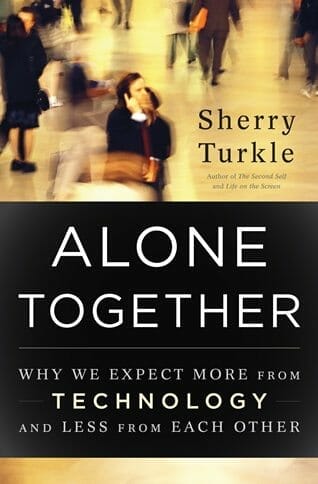
Alone Together: Why We Expect More from Technology and Less from Each Other
(Basic Books, January 2011)
Reclaiming Conversation® Advisory Services
Our increased reliance on digital technology has brought us out of balance with what we need as people: rich, robust and trusting relationships. In the workplace, technology is too often part of a flight from face-to-face conversation. Yet, it is through conversation that the relationships and ideas that underlie successful enterprises are born and thrive.
Beyond traditional talks, lectures and workshops about why and what it takes to be a conversational organization, Sherry Turkle, Ph.D., advises individuals and organizations on how to become one – through hands-on, immersive collaboration. A trusted advisor and master of implementation, she is an extension of your team. In short order, she identifies what’s most relevant to your business, diagnosing critical issues and opportunities that inform her prescriptive, unique-to-you solutions. Sherry’s research is in-depth; her recommendations are robust yet practical.
Sherry applies decades of proven research alongside her Reclaiming Conversation® framework and tools to help you – and your leaders and their teams – change behavior. Her expert counsel pinpoints the policies, procedures and programs required to make change real and workable within your organization.
Reclaim conversation within your organization – and/or with your customers and the world at large. Talk to Sherry about how she can become part of your team and dial-in to what it will take to make change happen for your business.
How to Build More Positive Futures with AI
Our interactions with machines shape our behaviors and understanding of the world more than ever before and some fear this could lead to a disastrous end. What happens when our relationships with machines challenge our ability to act on our intentions? Does artificial intelligence suppress our capacity for authentic leadership?
Sherry Turkle, Ph.D., a pioneering thinker on the emotional and ethical dimensions of technology, helps leaders and teams reclaim their ability to drive change and create positive futures in thought-provoking sessions designed to rekindle agency in the age of AI.
During transformative half- and full day sessions, participants will:
- Explore the Depths of Agency: Dive into the profound psychology of what motivates some individuals to act on their dreams while others feel paralyzed, even with abundant resources and potential at their disposal
- Fight Passivity: Dissect why many today, despite being well-educated and informed, find themselves feeling passive or disconnected from real-world activism and change
- Embrace Uncertainty: Challenge conventional paradigms to embrace the power of uncertainty and recognize its pivotal role in fostering dynamic and proactive leadership
- Reposition Technology: Engage in critical discussions about the implications of being in constant conversation with machines and the effect of interacting daily with entities that don’t prioritize truth
- Envision a Constructive Future with Tech: Collaboratively brainstorm how tech can complement and elevate human aspirations, rather than confine them. Move beyond dystopian narratives and co-create a future where technology serves genuine human purposes
Turkle’s methodological approach ensures participants not only grasp the theory but apply it. Interactive activities drive home the lessons, offering participants tangible strategies to integrate into their personal and professional lives.
Whether confronting tech’s effects in an organization or fostering proactive leadership, Turkle’s insights offer a fresh perspective. Tailorable to various organizational levels and industries, this session is an essential step towards reclaiming agency in a digital age.
Bridging the “Leadership Gap”
As technology quickly evolves, the business of leadership faces new challenges. Despite having powerful tools at their disposal, many leaders report a discernible gap between what they’d like to do and what they feel they are able to do. MIT professor and sociologist Sherry Turkle, with her insightful analysis of modern behaviors, identifies how today’s environments impact leadership capacities and suppress organic initiative-taking.
In full and half day sessions, Turkle guides participants through:
- The Anatomy of Leadership: Learn the intrinsic and extrinsic factors that define authentic leadership. Discover why some are natural leaders while others, even those who have had opportunities, feel held back.
- Disentangling Digital Distractions: Understand how continuous interactions with technology can enhance clear thinking, empower decisive action and foster leadership development.
- The Uncertainty Principle in Leadership: Reimagine uncertainty as a potent tool rather than a hurdle. Harness the potential of unpredictability to drive innovation and initiative.
- Move Beyond the Screen to the Real World: Learn strategies to transition from passive management to active leadership, bridging the divide between the digital realm and tangible impact.
Turkle’s sessions emphasize real-world applications over theoretical knowledge, ensuring that participants walk away with practical strategies to enhance their leadership skills. Customizable to suit groups of any size at all levels and industries, Turkle gives leaders effective guidance for shaping the role of leadership in tomorrow’s tech landscapes.
Reclaiming Empathic Capacities in Leadership
Social media made three promises: that we would never be alone, we would always be heard and that someone would always hear us. Now, generative AI adds to these promises: there will always be an interlocuter who will agree with you and support you. MIT professor and sociologist Sherry Turkle emphasizes that people can’t promise these things, while algorithms can – but when we accept these promises, we lose our capacities for empathy and authentic leadership. Turkle’s workshop takes people through four steps to reclaim the empathic capacities for leadership. An exceptional presenter, she guides participants through steps that include seeing an organization as a community and embracing conversations as more than a place where information is delivered, but rather as a place for human connection and motivation.
Other workshops Sherry Turkle can bring to your organization include:
The Conversational Organization
Reclaiming Conversation® at Work
“The audience loved her. Lots of good tweets about her talk, and relevance to our field”
“A beautifully wrought memoir about how emerging technology makes us think and feel [. . .] Anyone who studies, develops, or produces technology—and anyone who uses it—will gain crucial insights from this profound meditation on how technology is changing us. A masterful memoir by a pioneering researcher and incisive thinker.”
“[R]evelatory and forthright . . . Turkle’s candor and transparency are totally in keeping with her personal and professional commitment to understanding human emotional motivation and our capacity for empathy, not only towards others but also towards ourselves.”
“ [R]ichly detailed . . . Anyone who has felt the struggle to fit in will identify with [Turkle’s] story.”
“Since digital culture became part of our intimate lives, Sherry Turkle has helped us understand our complex, evolving dance with technology, using the power of data and analysis. Now, with raw and refreshing authenticity, she shares her personal journey, which serves as a powerful and poignant reminder that it is in our relationships with one another—not technology—that we find our most important source of meaning and healing.”
“In this beautiful, compulsively readable memoir, Sherry Turkle, who has asked why we expect ‘more from technology and less from each other,’ excavates the eras of her continually surprising 20th century life. In her hands, empathy is the instrument of knowledge, illuminating the uses and pleasures of crucial human values now under threat. This is the story not only of a woman but of her humane and exhilarating mind.”
“Sherry’s life story is that of a woman who made her own way—both in the academic world and in the larger cultural conversation—by following her passions without fear and with tremendous integrity. In so doing, she has helped us all understand a vital aspect of our lives with much greater clarity. “The Empathy Diaries” is a case study in courage and where it can take us.”
“Over the decades, Sherry Turkle has provided the most penetrating analyses of the relations between the human and the computational worlds. In a remarkably revealing memoir Turkle explores the personal as well as scholarly sources of her understandings and, in the process, provides a brilliant panorama of our time.”
“Sherry Turkle’s memoir is a page-turner, and I was so drawn in by its vivid narrative and exquisitely drawn characters that it took me a while to realize that this is also a strikingly original book about empathy. Her searing encounters with a stark lack of empathy in two of the most important men in her life—her scientifically driven father and renowned first husband—led her to the discovery that empathy is not simply an interesting research topic or ‘feminine’ virtue but, as it became for her, a ‘strategy for survival.’ The Empathy Diaries is a magnificent capstone to Sherry Turkle’s studies of the human costs of our romance with technology. Drawing on firsthand experience, she shows us how empathy is a lifesaving necessity in human relations and, potentially, a key to our survival as a species.”
“In this brilliantly integrated memoir, Sherry Turkle traces her metamorphosis from the gifted child of a disturbed man to the preeminent ethnographer of digital culture. One part intellectual history, one part daddy dearest, one part portrait of the critic as a young woman, this is a one-of-a-kind page-turner. Bravo!”
“I’ve long marveled at the remarkable and inspiring career of Sherry Turkle. Her path, so courageously interdisciplinary, has been strewn with dazzling insights. And now, in just the kind of brave and brilliant memoir one would expect from her, she gives us her personal story, explaining how, in a mind like hers, the deeply personal is transformed into ideas that can be shared by us all.”
“This is a scintillating memoir. Turkle acts at once as storyteller, ethnographer, and psychologist of her own life—one stretching from a straitened Brooklyn Jewish girlhood shadowed by an unspeakable secret to a womanhood of academic accomplishment amidst the excitements of Radcliffe, Harvard, Chicago, Paris in the years after the upheaval of ’68 and MIT just as our computer world is born. Along the way she gives us a vivid account of ideas crucial to the last half-century of intellectual life, tracing their inner history with bracing clarity.”
“By respecting her own emotional, social, and intellectual history with careful—even loving—attention, Sherry Turkle shows what rescue from the crisis of technological disconnect looks like. Intimate, compassionate, and critical, her book instructs, edifies, and heals. A paradigmatic personal narrative, yet The Empathy Diaries is a tour de force of social science, saluting and protecting the precious intangibility that no machine can match—the quality that makes us human.”
“Like a Harvard educated Nancy Drew, Sherry Turkle searches her past for clues to her true self and hits the mother lode in this fascinating, fearless memoir. Her struggle with the legacy of long-held family secrets as she forges her own unique path to authenticity and forgiveness is a story countless women will identify with. Reading The Empathy Diaries, I felt my mind—and my heart—expanding. Sherry Turkle is not only a great writer and teacher—she’s great company.”
“‘Use concrete events to think about large ideas. Use large ideas to think about concrete events.’ Sherry Turkle follows the advice of her professor, Samuel Beer, and The Empathy Diaries is the compelling result. The stages of Turkle’s narrative unfold so gracefully, in prose of such candor and clarity, that it’s easy to overlook how many tasks this memoir performs. The Empathy Diaries is about a childhood and a coming of age. It’s about a courtship and marriage. It’s also about the progress of Turkle’s engagement in the dynamic and overlapping fields in which this professor of social sciences, science, and technology is a crucial, authoritative, and, yes, empathetic voice. In every way, this is a book about an education. Fans of Turkle’s earlier work will certainly want to read The Empathy Diaries; but so too should everyone struggling in the cyber maze in which we find ourselves. A remarkable book.”
“I read it with delight. An honest, insightful, compelling, and sometimes painful account of the intellectual and emotional forces that shaped Turkle into a pioneer in the study of digital culture and how computers change the way we think about ourselves. Turkle’s is not only a personal story, but also a story of our digital age.”
“Sherry Turkle has been daring and original for a long time—bearing witness to the emergence of artificial intelligence but also writing forcefully, while surrounded by true believers at MIT, about its limitations. In “The Empathy Diaries,” she dares even further by investigating a tightly held family secret, affirming in the process the wisdom of the human heart. “The Empathy Diaries” tells a fascinating story—one that manages to be profound and entertaining at the same time.”





































